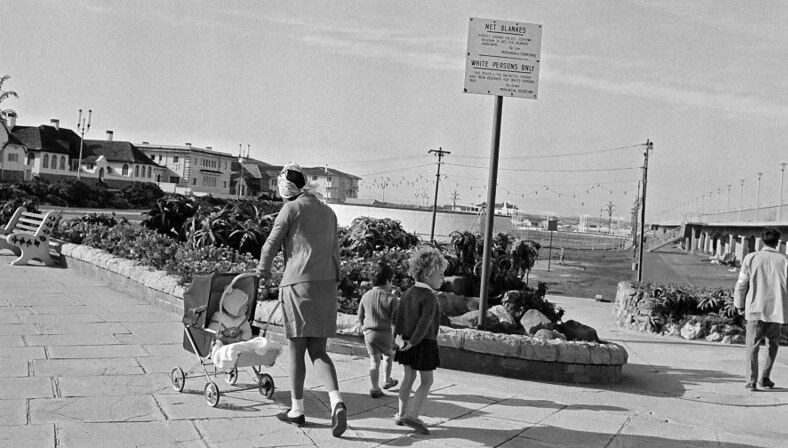Rock’n’roll revolution is a volatile thing. Not all cultures were ready for electric riffs and transgressive lyricism when the genre originated in the mid-twentieth century. For white Afrikaans speakers, it wasn’t until the late 1980s that the genre truly took off. During the false utopia of Apartheid, the government-aligned media promoted the sanitised music of conservative and sappy ballad singers such as Bles Bridges. But by 1989, five years before the end of Apartheid, a group of young Afrikaners capitalised on the revolutionary spirit that was sweeping the nation and went on a legendary cross-country tour, singing rock songs in Afrikaans. So the Voëlvry Movement was born.
Voëlvry literally translates to “free as a bird”, and also hints at the idea of a ‘jailbird’. This latter meaning was all too relevant as the group of singers associated with the movement were banned and pursued by government forces at every step of the way. Their pseudonyms included Johannes Kerkorrel (think “Johnny Churchorgan”), Bernoldus Niemand (“Bernoldus Nobody”), and band names like “Die Gereformeerde Blues Band” (“The Reformed Blues Band”) which parodied the name of the Dutch Reformed Church.
One of the most famous songs from the Voëlvry Movement, “Sit Dit Af” (Switch it Off), exemplifies the catchiness of the music: lyrics divided into short, snappy lines, a repetitive chanting chorus, heavy electric guitar, and a punchy political message. The song calls for the television to be switched off whenever conservative state leader P.W. Botha–a regular target of Voëlvry protest–appears on screen. Outspoken criticism of Botha’s Afrikaans-majority government from within the Afrikaans community was a radical departure from the past, and even though the tide was turning against the ageing politician by the late 1980s, the Voëlvry Movement’s provocative lyrics were still controversial enough to have their performances banned and their movements followed by the security service.
The rock artists were unperturbed. Koos Kombuis, one of the few figures still alive, even argued against labelling their music as alternative, saying that the mainstream was “unimaginably more weird than we could ever have dreamt of being.” Their music continued to satirise the state, with songs like “Wat ‘n Vriend het Ons in PW” (What a friend we have in PW) and “BMW” taking on conservative Afrikaners’ perspective in order to mock them. “BMW”, for example, opens with a long wailing saxophone solo imitating the annoying sound of a BMW engine, as these cars were associated with the conservative white middle class.
Unfortunately (and unsurprisingly), the irony of these songs were lost on some of their Afrikaner audience. During one performance in Potchefstroom a group of the audience–presumably of the BMW-driving variety–infamously cheered in support of the satirical lyric “We drive a BMW / Must we give everything to the black people?”. This raises the question of whether the Voëlvry artists could effectively protest the Apartheid government in the very language of the oppressors. As Audre Lorde argued in 1979 (a decade prior to the Voëlvry tour), “the master’s tools will never dismantle the master’s house”. Since the 1976 Soweto uprisings where several students lost their lives protesting against the use of Afrikaans in schools, it was clear that Afrikaans was the master’s bloody tool. In light of this, music from the likes of Miriam Makeba, Hugh Masekela, Abdullah Ibrahim, and Dorothy Masuka, which popularised traditional African music, afropop, and jazz genres are more representative of truly revolutionary anti-Apartheid music. The Voëlvry artists have also been criticised for their male-centric music. Karla Krimpalien was the movement’s only female singer, and her absence on streaming sites and Voëlvry Tour albums is notable.
It might be more accurate to say that the Voëlvry Movement protested against the Apartheid government than Apartheid itself, drawing on aspects of their rule other than their racist policies. For instance, songs like “Hou my vas, Korporaal” (Hold me, Corporal) were profound criticisms of systems like the conscription of young, white Afrikaans men into the armed forces from 1967 to 1990. The song has a playful tune and lyrics such as, “I play war with my best days […] me and all my playmates together,” allegorising the Angolan Civil War in which South African men were forced to participate as a childhood game. It also employs the Voëlvry’s trademark use of refrain as the song repeats “yes yes yes” dozens of times to refer to the obedience and respect for authority deeply ingrained in Afrikaner culture.
Another defining characteristic of their music was concerned with redefining what it meant to be a male Afrikaner. This is illustrated in songs like “Boer in Beton” (Boer/farmer in concrete) about the adjustment of city living and urbanisation for a people whose identity was deeply ingrained in farming the land. While dismantling Apartheid was certainly part of their punk message, their scope was limited to their own privileged demographic, which unsurprisingly reflected in the demographic of most of their audience.
This is not to diminish their role in forging a new, less restricted Afrikaans consciousness. For all their swearing and references to drugs and sex which categorised them as punk and caused many an old Afrikaner tannie to clutch at her sakdoek (handkerchief), the movement produced beautifully nuanced music. “Ossewa” (ox wagon), for example, reclaimed the ox wagon that had been a symbol of Afrikaner identity since the Groot Trek, reimagining it as “funky new rock’n’roll” car blaring Elvis songs, instead of completely abandoning their heritage. The Voëlvry artists clearly aimed to provide an example of a way to be both distinctly Afrikaans and disagree with the conservative government: it was now possible to be proudly Afrikaans with one’s Afrikaans-ness rooted in a cause worth fighting for, in liberal protest, in rock music.



